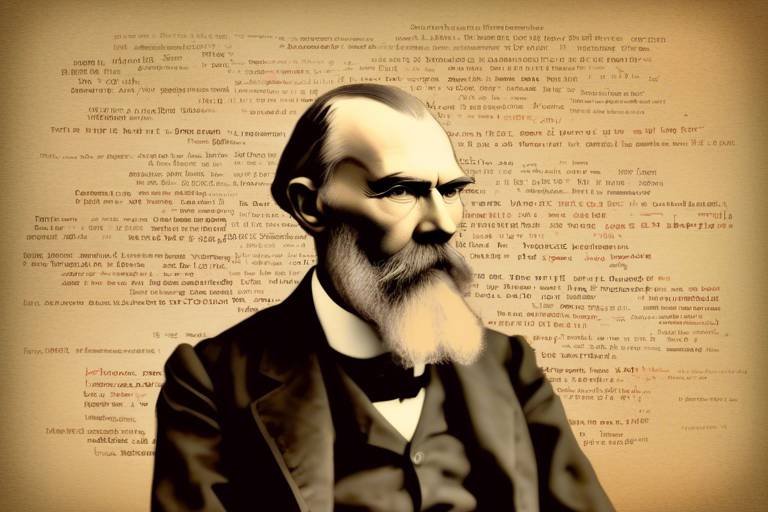Unpacking Feminist Philosophy: From Simone De Beauvoir to Judith Butler
Feminist philosophy is a rich and dynamic field that has evolved dramatically over the decades, driven by the voices of influential thinkers who have challenged the status quo. From the existential musings of Simone De Beauvoir to the groundbreaking theories of Judith Butler, each philosopher has contributed uniquely to our understanding of gender, identity, and power dynamics. This article aims to explore the evolution of feminist philosophy, highlighting key thinkers and concepts that have shaped the discourse, from early existentialism to contemporary gender theory.
In the early 20th century, De Beauvoir's work opened the floodgates for feminist thought, introducing ideas that questioned the very fabric of societal norms. She argued that women have been historically relegated to the status of "the Other," a concept that has become a cornerstone of feminist theory. Her seminal text, The Second Sex, not only critiques women's oppression but also serves as a clarion call for autonomy and self-definition. Through her lens, we can see how deeply entrenched gender roles are woven into the fabric of our lives, often dictating our choices and limiting our freedoms.
Fast forward to the late 20th century, and we encounter Judith Butler, who took De Beauvoir's foundational ideas and pushed them into new territory. Butler's concept of gender performativity argues that gender is not a static identity but rather a series of actions and performances that are socially constructed. This idea challenges the traditional binary understanding of gender, suggesting that our identities are fluid and shaped by cultural contexts. In this way, Butler's work not only builds on De Beauvoir's legacy but also critiques and expands it, offering a more nuanced understanding of how gender operates in society.
As we delve deeper into the contributions of these two thinkers, we can see how their ideas resonate with contemporary discussions on gender and identity. The dialogue between De Beauvoir and Butler highlights a continuum of thought that is both revolutionary and necessary. The evolution of feminist philosophy is not just a historical account; it is a living, breathing discourse that continues to shape our understanding of self and society.
- What is feminist philosophy? Feminist philosophy examines the ways in which gender influences our understanding of knowledge, reality, and ethics, often critiquing traditional philosophical perspectives that have marginalized women's experiences.
- Who is Simone De Beauvoir? Simone De Beauvoir was a French existentialist philosopher whose work laid the groundwork for feminist existentialism, particularly through her book The Second Sex.
- What is gender performativity? Gender performativity, a concept introduced by Judith Butler, posits that gender is not an inherent quality but rather a set of behaviors and actions that are repeated and shaped by societal expectations.
- How did De Beauvoir influence later feminist thinkers? De Beauvoir's exploration of women's oppression and the concept of 'the Other' has profoundly influenced many feminist theorists, including Judith Butler, who expanded on her ideas to explore gender identity and performance.

Simone De Beauvoir's Existentialism
Simone De Beauvoir's existentialism represents a pivotal moment in feminist philosophy, where the intersections of freedom, choice, and identity are critically examined. Her groundbreaking work emphasizes that women are not just passive beings shaped by societal norms but are active participants in defining their own existence. Imagine living in a world where your choices are dictated by others—this was the reality for many women in De Beauvoir's time, and she sought to challenge that status quo.
At its core, De Beauvoir's existentialism is about authenticity and the struggle for self-definition. She argues that women must embrace their freedom to make choices, regardless of societal expectations. This perspective is not just a philosophical stance; it is a clarion call for women to assert their agency. Through her lens, freedom is not merely the absence of oppression but a profound responsibility to shape one's identity and destiny.
Furthermore, De Beauvoir's work highlights the importance of choice in the construction of identity. She posits that identity is not a fixed attribute but rather a fluid construct that evolves through experiences and decisions. In her view, women have the power to redefine themselves, breaking free from the confines of traditional gender roles. This idea resonates deeply in contemporary discussions about gender fluidity and the spectrum of identity.
To better understand her philosophy, consider the following key concepts:
- Freedom: The ability to make choices that reflect one's true self.
- Responsibility: Acknowledging the consequences of one's choices and actions.
- Identity Construction: The ongoing process of defining oneself through personal experiences and societal interactions.
De Beauvoir's existentialism is not just an academic theory; it is a powerful framework for understanding the lived experiences of women. By emphasizing the importance of choice and the active role of women in shaping their identities, she laid the groundwork for future feminist thought. Her influence is evident in the works of later thinkers who further explored the complexities of identity and gender.
In conclusion, Simone De Beauvoir's existentialism serves as a beacon for those seeking to understand the intricacies of freedom, choice, and identity in a patriarchal society. Her ideas challenge us to rethink how we view ourselves and the roles we play in our lives. As we delve deeper into feminist philosophy, her insights continue to inspire and provoke thought, making her a timeless figure in the discourse on gender and existence.

The Second Sex: A Revolutionary Text
The Second Sex, published in 1949, is often hailed as a cornerstone of feminist literature. In this groundbreaking work, Simone De Beauvoir meticulously critiques the systemic oppression of women, illuminating the ways in which society has historically marginalized their experiences. De Beauvoir's insights were not just radical for her time; they continue to resonate today, challenging readers to confront uncomfortable truths about gender inequality.
At the heart of De Beauvoir's analysis is the concept of 'the Other'. She argues that women have been defined in relation to men, often relegated to a secondary status that denies them their full humanity. This idea of 'Otherness' is crucial in understanding how societal norms shape gender roles. De Beauvoir famously states, "One is not born, but rather becomes, a woman," suggesting that gender is a social construct rather than a biological imperative. This revolutionary perspective invites us to reconsider the narratives we accept about gender and identity.
De Beauvoir's exploration of women's oppression is not merely theoretical; she delves into the lived experiences of women throughout history. She examines how cultural, economic, and social factors intertwine to create a landscape where women's autonomy is often stifled. By documenting these experiences, she provides a rich tapestry that highlights the diverse realities of womanhood, making her arguments all the more compelling.
Among the key themes in The Second Sex are:
- The Social Construction of Gender: De Beauvoir emphasizes that gender roles are not innate but are shaped by societal expectations and norms.
- The Impact of History: She explores how historical events and movements have influenced women's lives and their roles in society.
- The Pursuit of Autonomy: De Beauvoir advocates for women's freedom to choose their paths, urging them to reject the limitations imposed by a patriarchal society.
One of the most profound aspects of De Beauvoir's work is her insistence on the importance of freedom and responsibility. She challenges women to embrace their agency and to assert their identities beyond societal constraints. This call for empowerment is not just about gaining equal rights; it's about redefining what it means to be a woman in a world that often tries to dictate those terms. De Beauvoir's vision is one of self-definition, where women can carve out their own identities and futures.
In summary, The Second Sex serves as a revolutionary text that not only critiques the status quo but also inspires a movement towards greater understanding and liberation. Its impact on feminist philosophy is immeasurable, laying the groundwork for future thinkers to build upon. As we continue to navigate the complexities of gender and identity, De Beauvoir's insights remain a vital part of the conversation.
Q: What is the main argument of The Second Sex?
A: The main argument of The Second Sex is that women's oppression is a result of societal constructs rather than biological determinism, emphasizing the need for women to assert their autonomy and redefine their identities.
Q: How did The Second Sex influence feminist movements?
A: The book has been instrumental in shaping feminist thought, inspiring activists and theorists to challenge patriarchal norms and advocate for women's rights and equality.
Q: What does De Beauvoir mean by 'the Other'?
A: 'The Other' refers to the way women have been historically defined in relation to men, often seen as secondary or inferior, which has contributed to their marginalization in society.

The Second Sex,
In The Second Sex, Simone de Beauvoir delivers a profound critique of women's oppression, fundamentally reshaping feminist thought. This seminal work is not just a book; it’s a clarion call for liberation and understanding. De Beauvoir's exploration of the female experience in a patriarchal society reveals the deep-seated structures that have historically subjugated women. She boldly asserts that “one is not born, but rather becomes, a woman,” emphasizing that gender is not an innate quality but a social construct shaped by cultural norms and expectations.
De Beauvoir's analysis goes beyond mere observation; she dives into the essence of what it means to be a woman in a world dominated by male perspectives. Her examination of women as the 'Other'—a term she uses to describe how women have been defined in relation to men—creates a critical framework for understanding the dynamics of gender. This concept of 'Otherness' is crucial, as it illustrates how societal structures have relegated women to a position of inferiority, forcing them to exist in a world where their identity is often defined by men.
Moreover, De Beauvoir challenges the idea of women as passive victims. She argues that women must take responsibility for their own lives and choices. This theme of freedom and responsibility is central to her philosophy, encouraging women to reject societal constraints and assert their autonomy. In this sense, The Second Sex serves not only as a critique but also as a guide for women seeking empowerment and self-definition. De Beauvoir’s work inspires a vision where women are not merely objects of history but active participants in shaping their destinies.
One of the most striking aspects of The Second Sex is its timeless relevance. Even decades after its publication, the themes it addresses resonate with contemporary discussions about gender equality and identity. De Beauvoir's insights into the social construction of gender and the historical context of women's lives continue to inform and inspire feminist discourse today.
| Key Themes in The Second Sex | Description |
|---|---|
| Social Construction of Gender | Explores how gender roles are created and enforced by society. |
| Impact of History | Analyzes how historical contexts have shaped women's experiences and identities. |
| Pursuit of Autonomy | Encourages women to seek independence and self-definition. |
In conclusion, The Second Sex is more than just a book; it’s a revolutionary text that has paved the way for future generations of feminist thinkers. By challenging the status quo and advocating for women's rights, Simone de Beauvoir has left an indelible mark on feminist philosophy. Her work continues to inspire and provoke thought, urging us to question the structures that define our identities and relationships.
- What is the main argument of The Second Sex?
The main argument is that gender is a social construct and that women are often defined as 'the Other' in relation to men, leading to their oppression.
- How did The Second Sex influence feminist thought?
The book laid the groundwork for feminist existentialism and encouraged women to assert their autonomy and challenge societal norms.
- What is the significance of the term 'Otherness'?
'Otherness' highlights how women have been historically marginalized and defined in opposition to men, which has significant implications for gender dynamics.

De Beauvoir critiques women's oppression and explores the concept of 'the Other,' fundamentally altering the landscape of feminist thought and inspiring future generations.
De Beauvoir's groundbreaking work laid the foundation for feminist existentialism, emphasizing the importance of freedom, choice, and the construction of identity in a patriarchal society.
In The Second Sex, De Beauvoir critiques women's oppression and explores the concept of 'the Other', fundamentally altering the landscape of feminist thought and inspiring future generations.
This section delves into the major themes of De Beauvoir's work, including the social construction of gender, the impact of history on women's lives, and the pursuit of autonomy.
De Beauvoir's idea of 'Otherness' illustrates how women have been historically defined in relation to men, providing a critical framework for understanding gender dynamics in society.
The themes of freedom and responsibility in De Beauvoir's philosophy challenge women to assert their agency and reject societal constraints, promoting a vision of empowerment and self-definition.
De Beauvoir's work significantly influenced later feminist theorists, including Judith Butler, who expanded on her ideas to explore the complexities of gender identity and performance.
Butler's contributions to feminist philosophy, particularly her theories on gender performativity, challenge traditional notions of gender as fixed and highlight the fluidity of identity.
This section examines Butler's concept of gender performativity, arguing that gender is not an inherent trait but rather a series of repeated actions and behaviors shaped by societal norms.
Butler's work has sparked debates within feminist circles, leading to both critiques and affirmations of her theories, ultimately enriching the discourse surrounding gender and identity politics.
In The Second Sex, Simone De Beauvoir brings to light the oppressive structures that have historically marginalized women. She argues that women have been relegated to the status of 'the Other', a term that signifies their position as secondary to men, who are viewed as the default or the norm. This critical distinction reshapes our understanding of gender relations by highlighting how societal constructs have defined femininity in relation to masculinity. De Beauvoir's analysis challenges readers to confront the uncomfortable truths about gender inequality and the pervasive nature of patriarchal dominance.
By exploring 'the Other', De Beauvoir not only critiques the systemic oppression of women but also lays the groundwork for a transformative feminist philosophy. She asserts that the liberation of women is intrinsically linked to the rejection of this binary categorization. In her view, women must reclaim their identity, not as a reflection of men but as autonomous beings with their own rights and desires. This powerful assertion resonates through generations, inspiring feminist movements and thinkers to advocate for equality and self-definition.
Furthermore, De Beauvoir’s work delves into the psychological and existential implications of being seen as 'the Other'. It raises essential questions about identity, freedom, and the societal expectations imposed on women. She encourages women to recognize that their oppression is not a natural state but a product of historical and cultural constructs. This realization is crucial for fostering a sense of agency and empowering women to challenge and dismantle the structures that confine them.
In essence, De Beauvoir's critique of women's oppression and her exploration of 'the Other' serve as a catalyst for feminist thought. Her insights continue to inspire contemporary discussions about gender, identity, and autonomy, making her work a cornerstone of feminist philosophy.
- What is the main argument of Simone De Beauvoir in The Second Sex?
De Beauvoir argues that women have been historically defined as 'the Other' in relation to men, which has led to their oppression and marginalization in society. - How did De Beauvoir influence feminist philosophy?
Her work laid the groundwork for feminist existentialism and inspired future generations to challenge patriarchal norms and advocate for women's rights. - What does Judith Butler contribute to feminist theory?
Butler introduced the concept of gender performativity, suggesting that gender is not a fixed trait but rather a series of behaviors shaped by societal expectations.

Key Themes in The Second Sex
Simone De Beauvoir's The Second Sex is not just a book; it's a manifesto that challenges the very fabric of societal norms regarding gender. One of the most striking themes that emerge from her work is the social construction of gender. De Beauvoir argues that gender is not an innate quality, but rather a role that society imposes. This perspective is revolutionary because it invites us to question the very essence of what it means to be a woman or a man. Have you ever thought about how much of our identity is shaped by the expectations of others? De Beauvoir encourages us to peel back these layers and see the truth beneath the surface.
Another significant theme in De Beauvoir's work is the impact of history on women's lives. She meticulously examines how historical context has shaped women's roles and experiences. The past is not just a series of events; it’s a powerful force that continues to influence our present. For instance, she discusses how women have been relegated to the private sphere, often seen as caretakers rather than individuals with their own aspirations. This historical lens allows us to understand the ongoing struggles women face today, making her insights timeless and relevant.
Perhaps the most empowering theme in The Second Sex is the pursuit of autonomy. De Beauvoir passionately advocates for women to assert their own identity and make choices that reflect their true selves. She famously states, “One is not born, but rather becomes, a woman.” This statement encapsulates her belief that women must actively engage in the process of self-definition. It’s a call to action, urging women to break free from societal constraints and embrace their individuality. Imagine the potential if every woman felt empowered to define her own path!
To further illustrate these themes, let's break down some key concepts:
| Theme | Description |
|---|---|
| Social Construction of Gender | Gender roles are imposed by society rather than being innate. |
| Impact of History | Historical context shapes women’s roles and experiences. |
| Pursuit of Autonomy | Women must actively define their own identities and choices. |
In summary, the key themes in The Second Sex are not merely academic concepts; they are calls to action that resonate with anyone who seeks to understand or challenge the status quo. De Beauvoir's work invites readers to reflect on their own lives and the societal structures that shape them. Are we merely playing roles that others have scripted for us, or are we the authors of our own stories? This question is at the heart of De Beauvoir's revolutionary philosophy.
- What is the main argument of The Second Sex?
De Beauvoir argues that women have historically been defined as 'the Other' in relation to men, and that gender roles are socially constructed rather than biologically determined.
- How does De Beauvoir define 'Otherness'?
'Otherness' refers to the way women have been historically defined and marginalized in relation to men, serving as a framework for understanding gender dynamics.
- What is the significance of autonomy in De Beauvoir's philosophy?
Autonomy is crucial as it empowers women to assert their identity and make choices that reflect their true selves, challenging societal constraints.

The Concept of 'Otherness'
Simone De Beauvoir's concept of ‘Otherness’ is a pivotal idea that sheds light on how women have historically been positioned in relation to men. This notion is not merely a philosophical abstraction; it resonates deeply within the fabric of society. By defining women as the ‘Other’, De Beauvoir illustrates a fundamental power dynamic where men are seen as the ‘Self’, the norm, and the standard against which women are measured. This binary classification creates a hierarchy that has profound implications for gender relations, identity formation, and societal expectations.
To understand this concept fully, one must consider the implications of being defined as the ‘Other’. Women have often been relegated to a secondary status, viewed through the lens of male perspectives and interests. This positioning leads to a range of consequences, including:
- Marginalization: Women’s voices and experiences are often sidelined, leading to a lack of representation in various fields.
- Identity Formation: Women are pressured to shape their identities based on societal expectations rather than their own desires and aspirations.
- Social Roles: The concept of ‘Otherness’ reinforces traditional gender roles, limiting opportunities for women to explore their potential beyond societal constraints.
De Beauvoir argues that this construction of ‘Otherness’ is not just a reflection of reality but a mechanism that perpetuates oppression. By viewing women as ‘the Other’, society denies them the autonomy and freedom that are essential for true equality. This framework allows us to critically analyze how gender dynamics operate and encourages women to challenge these imposed identities.
Moreover, the implications of ‘Otherness’ extend beyond gender. It serves as a lens through which we can examine various forms of oppression, including race, class, and sexuality. By recognizing the commonalities in how different groups are marginalized, we can foster a more inclusive feminist discourse that acknowledges intersectionality.
In essence, De Beauvoir’s exploration of ‘Otherness’ invites us to question the very foundations of our social structures. It urges women to reclaim their identities and assert their presence as ‘Selves’ rather than mere reflections of male norms. This reclamation is not just a personal journey but a collective movement towards a more equitable society.
- What does 'Otherness' mean in feminist philosophy?
‘Otherness’ refers to the way women have been historically defined in relation to men, positioning them as secondary and marginalized. - How does De Beauvoir's concept of 'Otherness' apply today?
It continues to be relevant in discussions about gender inequality, identity politics, and the need for intersectional feminism. - Can 'Otherness' apply to other marginalized groups?
Yes, the concept can be used to analyze the experiences of various marginalized communities, including racial and sexual minorities.

Freedom and Responsibility
Simone De Beauvoir's philosophy intricately weaves the themes of freedom and responsibility into the fabric of feminist thought. At its core, her argument asserts that women must embrace their freedom to define their own identities, rather than allowing society to dictate who they should be. This call to action is not merely about gaining rights or autonomy; it is about recognizing that freedom comes with the weight of responsibility. In a world where societal norms often impose limitations, the challenge is to break free from these constraints and take ownership of one’s choices.
De Beauvoir posits that true freedom is not just the absence of oppression but also the active engagement in shaping one’s own life. This means that women must not only seek to escape the roles imposed upon them but also to understand that each choice they make carries consequences. For instance, when a woman decides to pursue a career, she is not just claiming her freedom; she is also acknowledging her responsibility to navigate the challenges that come with that choice, such as balancing work and personal life or confronting gender biases in the workplace.
In this light, freedom transforms from a mere concept into a powerful tool for self-definition. It encourages women to reflect on their desires, aspirations, and the societal expectations that might conflict with them. De Beauvoir urges women to ask themselves: What do I truly want? What does freedom mean for me? These questions are crucial in the journey toward self-empowerment. The pursuit of freedom is an ongoing process that requires constant reevaluation of one's choices and their implications.
Moreover, De Beauvoir's emphasis on responsibility extends beyond the individual. It encompasses a collective responsibility to challenge and dismantle the oppressive structures that limit freedom for all women. By recognizing that their liberation is intertwined with the liberation of others, women can foster a sense of solidarity and community. This interconnectedness is vital; it reminds us that while we are responsible for our own choices, we also play a role in shaping the world around us.
In conclusion, the interplay of freedom and responsibility in De Beauvoir's philosophy serves as a guiding principle for feminist thought. It challenges women to step into their power, embrace their choices, and recognize the broader implications of their actions. This duality not only promotes personal growth but also paves the way for a more equitable society where women can thrive as individuals and as part of a collective.
- What is the main idea behind De Beauvoir's concept of freedom?
De Beauvoir believes that freedom is not just the absence of oppression but the active engagement in defining one's identity and making choices. - How does responsibility play a role in women's freedom?
Responsibility emphasizes that with freedom comes the need to consider the consequences of one's choices and to challenge societal norms that restrict autonomy. - Why is solidarity important in De Beauvoir's philosophy?
Solidarity highlights that individual liberation is interconnected; women must support each other to dismantle oppressive structures collectively.

Influence on Later Feminist Thinkers
Simone De Beauvoir's profound insights and revolutionary ideas have left an indelible mark on feminist philosophy, influencing a multitude of thinkers who followed in her footsteps. One of the most notable figures shaped by her work is Judith Butler, who took De Beauvoir's foundational concepts and expanded them into the realm of gender theory. Butler's exploration of gender as a performative act builds upon De Beauvoir's assertion that identity is not a static essence but rather a dynamic construction influenced by societal expectations.
Butler's theories challenge the traditional binary understanding of gender, suggesting instead that gender is a fluid spectrum. This perspective can be traced back to De Beauvoir's idea that women have often been defined in relation to men, a notion that Butler elaborates on by emphasizing the performative nature of gender roles. Essentially, Butler argues that gender is not something we are, but rather something we do. This idea resonates deeply with De Beauvoir's assertion that women must actively define themselves rather than accept imposed identities.
Furthermore, the influence of De Beauvoir extends beyond Butler to a wide range of feminist theorists and activists who have grappled with her ideas. For instance, the following thinkers have drawn inspiration from De Beauvoir's work:
- Angela Davis - Focused on intersectionality and how race and class intersect with gender.
- bell hooks - Critiqued the patriarchy and emphasized the importance of love and community in feminism.
- Julia Kristeva - Explored the relationship between language, identity, and the feminine experience.
This lineage illustrates how De Beauvoir's work serves as a pivotal reference point for contemporary feminist discourse. Her emphasis on freedom and autonomy continues to resonate, prompting later thinkers to challenge the societal norms that restrict women's identities and roles. The ongoing dialogue initiated by De Beauvoir has paved the way for a rich tapestry of feminist thought, where each new voice builds upon the insights of those who came before.
In summary, De Beauvoir's legacy is not merely confined to her own writings; it reverberates through the corridors of feminist thought, inspiring a diverse array of scholars and activists to push the boundaries of what it means to be a woman in society. Her influence can be seen in the way contemporary feminism addresses issues of identity, power, and representation, ensuring that her revolutionary spirit continues to ignite discussions and inspire action in the quest for gender equality.
- Who was Simone De Beauvoir?
Simone De Beauvoir was a French existentialist philosopher, writer, and feminist known for her groundbreaking work, "The Second Sex," which critiques women's oppression and explores gender dynamics. - What is Judith Butler known for?
Judith Butler is a prominent feminist theorist known for her concept of gender performativity, which argues that gender is not an inherent trait but a series of actions shaped by societal norms. - How did De Beauvoir influence later feminist thinkers?
De Beauvoir's ideas about freedom, identity, and the social construction of gender laid the groundwork for later theorists like Judith Butler, who expanded on these concepts to explore the fluidity of gender and identity.

Judith Butler and Gender Theory
Judith Butler is a towering figure in the realm of feminist philosophy, particularly known for her groundbreaking work on gender theory. Her ideas have fundamentally reshaped how we understand gender, identity, and the very fabric of social norms. In a world where categories like "man" and "woman" have long been seen as rigid and binary, Butler throws a wrench into the gears, suggesting that gender is not a fixed trait but rather a performance—an ongoing act that we engage in based on societal expectations. Think of it like a play: we all have roles to fill, but those roles are not predetermined; they are shaped by the cultural scripts we follow.
Butler's concept of gender performativity posits that gender is not something we are, but something we do. This idea challenges the traditional view that gender is innate, leading to a more fluid understanding of identity. Imagine if your identity were like a dance—sometimes you follow the rhythm, sometimes you improvise, and sometimes you even change the tune. This perspective opens the door to a richer understanding of how individuals navigate their identities in a complex world.
In her seminal work, Gender Trouble, Butler argues that gender is constituted through repeated performances of gendered behaviors. This means that every time someone dresses a certain way, speaks in a particular tone, or engages in specific activities, they are participating in the ongoing construction of gender. It's not just a matter of personal choice; it's a complex interplay of societal norms and individual agency. Butler's theories encourage us to question the very foundations of gender identity and consider how our actions contribute to the larger narrative of gender in society.
However, Butler's ideas have not been without controversy. Some critics argue that her theories can lead to a form of relativism that undermines the struggles for women's rights and identity politics. They worry that if gender is entirely performative, then the lived experiences of those who face oppression based on their gender identity might be diminished. Yet, Butler herself engages with these critiques, emphasizing that recognizing the fluidity of gender does not negate the reality of oppression; rather, it provides a more nuanced understanding of how power operates in society.
To further illustrate Butler's impact, consider the following table that summarizes her key contributions to gender theory:
| Concept | Description |
|---|---|
| Gender Performativity | The idea that gender is an ongoing performance shaped by societal norms. |
| Critique of Binary Gender | Challenges the traditional male/female dichotomy, advocating for a more fluid understanding of gender. |
| Intersectionality | Explores how various identities (race, class, sexuality) intersect with gender, influencing experiences of oppression and privilege. |
Butler's work has sparked vibrant debates within feminist circles, leading to a rich tapestry of discussions about identity, power, and resistance. Her theories have not only influenced feminist thought but have also permeated other fields, including queer theory, cultural studies, and political philosophy. By challenging us to rethink how we understand gender, Butler empowers individuals to embrace their identities in all their complexity.
- What is gender performativity? Gender performativity is the idea that gender is not something we are, but something we do through repeated behaviors and actions shaped by societal expectations.
- How did Judith Butler influence feminist philosophy? Butler's theories challenged traditional notions of gender, emphasizing its fluidity and the role of societal norms in shaping identity, which has enriched feminist discourse.
- What are some critiques of Butler's theories? Critics argue that her ideas may undermine the lived experiences of those facing gender-based oppression by suggesting that gender is entirely performative.

Gender Performativity Explained
Judith Butler's concept of gender performativity is a game-changer in feminist philosophy, shaking the very foundations of how we perceive gender. Instead of viewing gender as a fixed attribute, Butler argues that it is more of a performance—a series of actions and behaviors that we enact based on societal expectations. Imagine gender as a theatrical play where everyone is given a role to perform. Each time we dress, speak, or behave in a way that aligns with societal norms, we are essentially rehearsing and performing our gender roles. This is not just a one-time act; it’s a continuous performance that shapes our identity over time.
Butler challenges the notion that gender is something we simply have. Instead, she posits that it is something we do. This idea is revolutionary because it opens up the possibility for gender fluidity. If gender is performative, then it can change and evolve based on context, culture, and individual choice. For instance, a person might express their gender differently in a professional setting compared to a casual gathering with friends. This variability emphasizes the idea that gender is not a static identity but a dynamic process.
To further unpack this concept, consider the following key points:
- Gender is Socially Constructed: Our understanding of what it means to be 'male' or 'female' is shaped by cultural norms and societal expectations.
- Repetition Creates Gender: The more we perform certain gendered behaviors, the more they become ingrained in our identities.
- Agency in Performance: While societal norms influence our performances, individuals have the power to subvert and redefine these norms.
Butler’s theories also intersect with the idea of subversion. By intentionally performing gender in unexpected ways, individuals can challenge and disrupt traditional gender norms. For example, a person who identifies as male might choose to wear traditionally feminine clothing, thereby questioning the rigid boundaries of gender identity. This act of defiance not only asserts personal agency but also invites others to reconsider their own perceptions of gender.
In essence, Butler's exploration of gender performativity invites us to rethink how we define ourselves and others. It encourages a more inclusive understanding of identity, one that acknowledges the complexities and fluidity of gender. By recognizing that gender is performative, we can embrace a world where everyone has the freedom to express their identity authentically, free from the constraints of societal expectations.
- What is gender performativity? Gender performativity is the idea that gender is not an inherent trait but rather a series of actions and behaviors that are performed based on societal norms.
- How does gender performativity challenge traditional gender roles? It suggests that gender roles are not fixed but can change and be redefined, allowing for more fluid expressions of identity.
- Can anyone perform a different gender? Yes, gender performance is accessible to everyone, and individuals can choose to express their gender in ways that may not align with traditional norms.

Critiques and Contributions
Judith Butler's work has undeniably transformed the landscape of feminist philosophy, yet it has not been without its share of critiques. Many scholars and activists have engaged with Butler’s theories, leading to a rich tapestry of discussion that both challenges and affirms her ideas. One of the most significant critiques revolves around the concept of gender performativity. Critics argue that while Butler effectively deconstructs traditional notions of gender, her focus on performance may inadvertently downplay the material realities and lived experiences of women, particularly those who face systemic oppression.
Moreover, some feminist theorists contend that Butler's emphasis on fluidity and the performative aspects of gender could lead to an erasure of the categories of sex and gender that many women rely on for political solidarity. This concern raises an important question: if gender is entirely fluid and constructed, how do we address the very real inequalities that exist within a binary framework? Critics argue that Butler's approach may risk alienating those who find empowerment in identifying with specific gender categories.
In response to these critiques, Butler has clarified that her work is not intended to dismiss the significance of identity but rather to challenge the rigid boundaries that have historically confined it. Butler's contributions have sparked a broader conversation about the intersectionality of gender, race, and class, emphasizing that identities are multifaceted and cannot be understood in isolation. This dialogue has led to the emergence of new feminist frameworks that incorporate the complexities of identity politics.
To further illustrate the impact of Butler's theories, consider the following table that outlines key critiques alongside their corresponding contributions:
| Critiques | Contributions |
|---|---|
| Downplays material realities of oppression | Encourages a nuanced understanding of identity as fluid |
| Risks erasing categories of gender for solidarity | Promotes intersectionality in feminist discourse |
| Challenges traditional feminist frameworks | Fosters innovative approaches to gender and sexuality |
Ultimately, the ongoing debates surrounding Butler’s work highlight the dynamic nature of feminist philosophy. By engaging with critiques, Butler's theories have evolved, leading to a more inclusive and comprehensive understanding of gender. This process of dialogue and reflection is vital for any intellectual movement, ensuring that it remains relevant and responsive to the needs of those it seeks to empower.
- What is gender performativity? Gender performativity is the idea that gender is not an inherent quality but rather a series of actions and behaviors that are socially constructed and repeated.
- How has Judith Butler influenced feminist thought? Butler has challenged traditional notions of gender, emphasizing its fluidity and the importance of societal norms in shaping identity.
- What are some critiques of Butler's theories? Critics argue that her focus on performance may overlook the material realities of oppression and the importance of fixed identities for political solidarity.
Frequently Asked Questions
- What is feminist philosophy?
Feminist philosophy is an area of philosophy that examines the ways in which gender influences our understanding of the world. It challenges traditional philosophical ideas by incorporating women's experiences and perspectives, aiming to address issues of oppression and inequality.
- Who is Simone De Beauvoir?
Simone De Beauvoir was a French existentialist philosopher, known for her groundbreaking work, "The Second Sex." In this influential text, she explores women's oppression and the concept of 'the Other,' laying the groundwork for feminist existentialism and inspiring future feminist thinkers.
- What are the key themes in "The Second Sex"?
The key themes in "The Second Sex" include the social construction of gender, the historical context of women's lives, and the pursuit of autonomy. De Beauvoir critiques how women have been defined in relation to men and emphasizes the importance of freedom and self-definition.
- What does the concept of 'Otherness' mean?
The concept of 'Otherness' refers to how women have historically been defined as the 'Other' in relation to men, who are seen as the norm. This idea helps to understand the dynamics of gender and the societal structures that contribute to women's oppression.
- How did Judith Butler build on De Beauvoir's ideas?
Judith Butler expanded on De Beauvoir's ideas by introducing the concept of gender performativity, which posits that gender is not a fixed trait but rather a series of actions and behaviors influenced by societal norms. This perspective challenges traditional notions of gender identity.
- What is gender performativity?
Gender performativity is the idea that gender is constructed through repeated actions and performances rather than being an inherent quality. Butler argues that these performances are shaped by cultural expectations and can be subverted, allowing for a more fluid understanding of identity.
- What are some critiques of Judith Butler's work?
Butler's theories have sparked debates within feminist circles, with some critics arguing that her ideas may overlook the material realities of gendered experiences. However, many affirm her contributions, acknowledging that her work enriches the discourse on gender and identity politics.
- Why is feminist philosophy important today?
Feminist philosophy is crucial today as it continues to address ongoing issues of gender inequality, discrimination, and the complexities of identity. It provides critical frameworks for understanding and challenging societal norms, ultimately striving for a more equitable world.


















